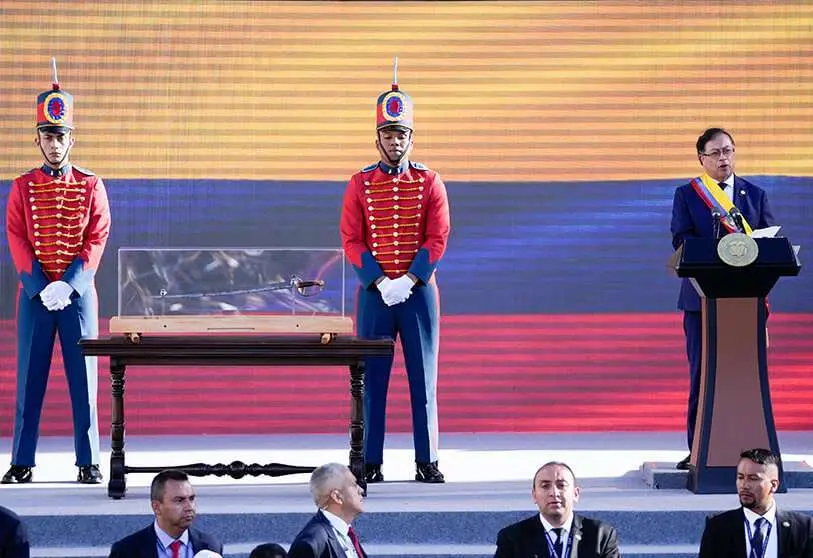Gustavo Petro, a president between sabres

On 7 August 1819, Simón Bolívar and his army defeated the Spanish Crown. And several South American territories gained their independence, including Colombia. It was also on 7 August 2022 that Gustavo Petro proclaimed himself the country's first left-wing president, bringing out the guerrilla's sword.
Why would this relic occupy an important space in Petro's inauguration?
"As president I ask the Casa Militar to bring Bolívar's sword. An order of the popular mandate and of this president". This was his first "order and command" after taking the oath of office, thus giving prominence to the Liberator.
A Creole of Spanish origin and a power-hungry landowner. He won the war against Spain, with the help of the Indians, to become president of Venezuela, Colombia, Bolivia and Peru. But he failed in his attempt to unify the continent under his empire. Moreover, his intention was never to emancipate the Indians, whom he regarded as unbridled ignoramuses, although he did generate widespread anti-Spanish sentiment that endures. A game to which the king, Felipe VI, did not lend himself.
Simón Bolívar was a "take you off to put me on". He was a traitor to his homeland. Many historians agree that the indigenous South Americans had been (and continue to be) used, in their just demands, by left-wing opportunists. This manipulation could be considered the great fake new of modern history. Aware of this, and for more than two decades, the US had stopped intervening in the continent, although it is still under the spotlight.
During the election campaign, Petro, the candidate of the left-wing coalition Historical Pact, changed his radical discourse to a more moderate one, appealing to social change. And with this he achieved his desired victory at the third attempt.
But his radicalism came to the fore, with Bolívar's sword, at the same ceremony. An act in which the former M-19 guerrilla was promoted to Supreme Commander of the country's Armed Forces. The military leadership was then changed. This was interpreted as a purge for the sake of speed. He even went so far as to touch on a matter as banal as it was symbolic by personifying the Presidency's website, giving his own name to an institutional URL. This earned him the criticisms of "populist", "egocentric" and "personality cult", among others.
Ahead of him lies the risky task of the social change he proposes. But first he must achieve internal peace. This can only be achieved by making concessions to the radicals of the various insurgent lefts. This seems difficult in the face of the hard core of the right-wing opposition, which also includes businessmen who accuse him of wanting to implement a failed socialism and a press that keeps reminding him of his past.
Governmental changes in Latin America tend to have consequences. What does not change, whoever governs, are the massacres that make up the violent map of Colombia. Homicides, forced displacements or clashes between armed gangs are an ordeal for indigenous populations opposed to drug trafficking and coca cultivation.
Moreover, if the changes are populist, their reach goes beyond the continent, affecting international relations. Thus, after unearthing the "hatchet" of war, Petro prioritised reconciliation with Cuba, Venezuela and the defeated Polisario Front terrorist group that calls for attacks in the Sahrawi provinces of southern Morocco.
A decision that contradicts the majority sentiment of the international community, which advocates autonomy under Moroccan sovereignty. In fact, his turnaround is absolutely inconsequential as well as rude. Especially when Petro is incapable of appointing an ambassador to Tindouf, but does deal with Morocco as an observer country, along with Spain, in the Andean Community (CAN), of which Colombia is a member.
The alliance with the Polisario, and thus with the pro-Russian bloc, has been strongly contested by Peru. Peru, also a member of the CAN, has just withdrawn its recognition of the self-proclaimed Polisario Republic, breaking off the non-existent relationship with this phantom entity. At the same time, it values and respects the territorial integrity of the Kingdom of Morocco and its sovereignty over the Sahara.
Petro's priority should focus on achieving internal social peace and recovering the sovereignty of a country like Colombia, which has been torn apart by conflict. It also suffers from a serious crisis of governance due to power imbalances and the fragmentation of Colombian society. Well-structured armed groups effectively control large territories and their municipalities.
Thus, FARC dissidents, who continue to wage war, the National Liberation Army (ELN), criminal gangs known as BACRIM or organised armed groups (GAO), some with an international dimension, constantly threaten peace and security in Colombia. Such is the case of the Clan del Golfo or the Águilas Negras, among others. More than ten armed actors have taken over vast regions, rents and trade, exercising socio-economic control over time and space. Only a few days ago, President Petro's convoy was attacked with bullets in Catatumbo.
The inauguration of Gustavo Petro was a vindication of the religious Marxism of liberation theology. And the forced presence of the Bolivarian sword was a clear threat to the status quo, potentially returning Colombia to the past.
To continue on this path, already failed in Latin America, forgetting what matters most to Colombians now, is to follow in the Venezuelan footsteps.
A replacement of the political system in a convulsive and uncertain geo-economic and geo-political moment would be heartbreaking and, on the other hand, has nothing to do with Bolívar. A wealthy well-to-do man who belonged to the ruling class at a time when the class difference was abysmal.
The promise of social change is déjà vu on the continent, although it would be an experiment as novel as it would be daring in Colombia. That is why the sword of Bolívar could become the sword of Damocles that will hang over Petro throughout his term in office.

